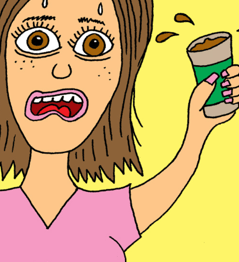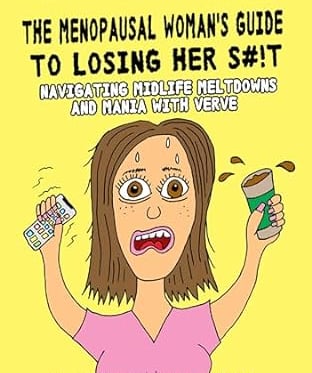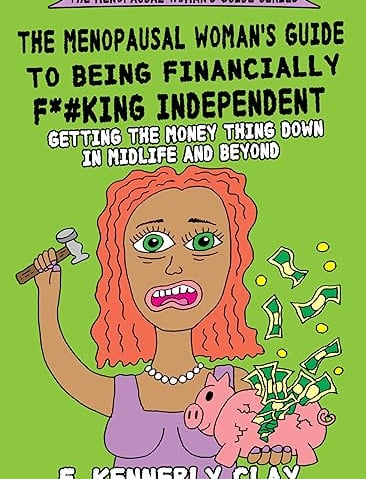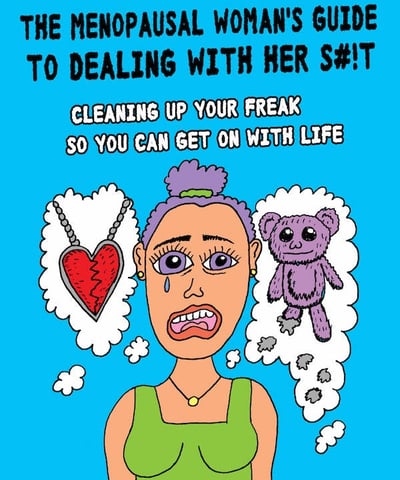Crying All the Time in Menopause: What's Going On?
MENOPAUSAL DEPRESSIONMENOPAUSAL SYMPTOMS
Kennerly Clay
9/15/20246 min read


Why do I cry so much during menopause?
If you’ve found yourself crying at the drop of a hat during menopause, we totally get it. It can be upsetting just to feel so upset so easily, while also feeling embarrassing. Crying at inopportune moments (raise your hand if you've started weeping in the middle of a work meeting) and wondering what's "wrong" - is it depression? Is it just hormones coming and going? Do you need to see someone to talk to or just suck it up and deal with it?
Menopause brings with it a shitshow of changes—physically, emotionally, and mentally—that can leave even the most composed person feeling more sensitive than usual. For some women, depression sets in during in menopause. For others, there are emotional dips that signal the hell-raising hormones at play, like when you tear up during a commercial or get misty-eyed over something seemingly small. Menopause and mental health go hand in hand, so let’s break down why this happens and what you can do about it.
If you or someone you know is in crisis, please call 988, the Suicide & Crisis Lifeline in the United States.
Can hormones cause uncontrollable crying?
One of the biggest culprits behind the increased tearfulness during menopause is fluctuating hormones, particularly estrogen and progesterone. Estrogen plays a significant role in regulating serotonin, the "feel-good" neurotransmitter in the brain that helps stabilize mood. As estrogen levels drop during menopause, so does serotonin, which can lead to mood swings, irritability, and—yup—unexpected crying spells.
Progesterone, another key hormone, can also impact mood. When levels of this hormone drop, it may make you feel more anxious or uneasy, further contributing to emotional outbursts. It’s not uncommon for women going through menopause to experience a wide range of emotions, from joy to frustration to sadness, sometimes all in the span of a single day (or what often feels like a single moment).
Estrogen and emotional upheaval
Menopause often coincides with significant life transitions, which can also contribute to emotional ups and downs. Many women may be dealing with children leaving home, aging parents, changes in relationships, or even career shifts. This period can stir up a lot of reflection and even some emotional upheaval, making crying a natural outlet for those complex feelings. Grief, too, can be a significant aspect of the menopausal transition. The death of loved ones or of pets, or the "death" of old friendships that turn sour or fall apart, can all have devastating affects on women who are already coping with the hellride of hormones. Feeling sad in menopause is often driven by a combination of hormones as well as life stressors and circumstances.
Sleep disturbances and crying
Menopause can also disrupt sleep patterns, thanks to night sweats, hot flashes, and general restlessness. Talk to half a dozen women in perimenopause or beyond and you'll get a resounding, "Yep, I wake up at 3:30 every morning, wide awake." Or you've got to get up and pee, or your partner is snoring or life just continues to distract you all through the night. Poor sleep has a well-documented effect on mood and emotional regulation, so if you’re not getting enough rest, you may find yourself feeling more irritable, and yes, more tearful than usual.
Without proper sleep, it’s harder to maintain emotional balance. You might find that things that wouldn’t have bothered you much in the past suddenly feel overwhelming. It’s like the emotional filter that normally helps you brush off minor irritations has disappeared, and everything feels amplified.
Menopause survival tip sheet
The Menopause Madness Relief Kit is a hand-curated list of menopausal survival tips from women who've been to hell and back.


Many women feel as though the menopausal "buildup" is in fact the buildup of years and years of tolerating inconveniences or feeling dissatisfied or suppressed in relationships, or in life.
Menopausal symptoms and crying all the time
Aside from the emotional and mental challenges, menopause often brings with it a slew of physical symptoms—hot flashes, headaches, weight changes, and more. These symptoms can be stressful, and when compounded with everything else, they can take a real toll on your emotional state.
Feeling physically uncomfortable day after day can lead to frustration, and frustration can easily manifest as tears. It's your body’s way of releasing some of the emotional buildup from managing all these changes. Many women feel as though the menopausal "buildup" is in fact the buildup of years and years of tolerating inconveniences or feeling dissatisfied or suppressed in relationships, or in life. In menopause, many of us can relate to giving fewer fucks and feeling like something has come unleashed - our willingness to speak out, speak up, say no, leave - whatever it is.
How to deal with crying in menopause
While it’s completely normal to feel more emotional during menopause, there are a few things you can do to help manage those unexpected crying spells.
Focus on self-care
First and foremost, make sure you’re taking care of yourself. Regular exercise, a healthy diet, and stress-relieving activities like yoga or meditation can help balance your mood. Even just setting aside a few minutes a day for yourself can make a world of difference. When you’re kind to your body, it responds in kind, helping you feel more in control of your emotions. Giving to yourself is nurturing and can help offset your dis-ease or dissatisfaction with other areas of your life.
Get plenty of sleep
Of course it's easier said than done, but getting enough rest is critical. Establish a calming bedtime routine, avoid caffeine in the late afternoon, and keep your bedroom cool to reduce the likelihood of hot flashes interrupting your sleep. Set aside moments in the day to take a reprieve and recuperate, if only for 10 or 15 minutes. You can close your eyes, listen to a short meditation, lie down or recline for a few minutes - anything to help offset the nighttime insomnia. If menopause-related sleep issues persist, consider talking to your healthcare provider for additional solutions, like hormone therapy or sleep aids.
Talk to your doctor
If you feel like your emotions are getting the best of you, it may be helpful to talk to your healthcare provider about options like hormone replacement therapy (HRT). HRT can help regulate your hormone levels and may ease some of the mood swings and emotional sensitivity associated with menopause. If HRT isn’t right for you, your doctor may suggest alternatives like antidepressants, cognitive-behavioral therapy, or natural supplements that promote emotional balance.
Seek emotional support
Don’t underestimate the power of talking things through with someone you trust. Whether it’s a friend, a partner, or a therapist, having someone to share your feelings with can be incredibly helpful. Sometimes just vocalizing what’s going on inside your head can make things seem less overwhelming.
Additionally, connecting with other women going through menopause can help you feel less isolated. Many online support groups and forums exist where women share their experiences, tips, and advice.
It’s totally okay to cry
In the end, it’s important to remember that crying is a normal, healthy response to emotional stress. Don’t be hard on yourself if you find yourself crying more than you used to. There may not necessarily be anything "wrong" as you begin to accept greater sensitivity and emotional fluctuations in menopause. Your body is going through significant changes, and it’s natural for emotions to bubble up during such a transformative time.
Instead of feeling embarrassed or frustrated by your tears, try to embrace them as part of the process. Sometimes, a good cry is just what you need to release stress and feel more centered. So, the next time you feel a tear welling up, go ahead and let it out. You’re doing great, and there’s no shame in being a little more emotional during this time of life.
Books for women who are losing it in menopause
Mental Health
Losing your mind in peri/menopause?
The menopausal woman's guide series
Financial Health
Had enough of financial insanity?
Personal Growth
Triggers? Old stuff kicking up?
Related topics
Explore helpful articles, tips, and advice for women who are losing their shit in menopause.
Community
Stay Connected
© 2024. Eclectic Content, Inc. All rights reserved.






